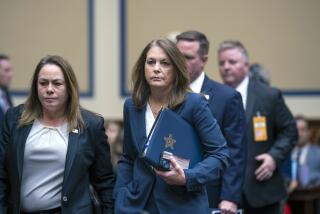Investigation of Pat Tillman misinformation goes nowhere
SAN FRANCISCO — A “striking lack of recollection” by White House and military officials has prevented congressional investigators from determining who was responsible for misinformation spread after the friendly-fire death of Army Ranger Pat Tillman in 2004, a House committee said Monday.
Although military investigators determined within days that the onetime NFL player was killed by his own troops in Afghanistan after an enemy ambush, five weeks passed before the circumstances of his death were made public. During that time, the Army claimed Tillman was killed by enemy fire.
The chairman of the House Committee on Oversight and Government Reform, Henry A. Waxman (D-Beverly Hills), said in April 2007 that his goal was to learn if the misinformation was “the result of incompetence, miscommunication or a deliberate strategy.”
The panel has failed, it acknowledged Monday. It received a flurry of White House e-mails but no documents about friendly fire. It interviewed several top White House officials: “Not a single one could recall when he learned about the fratricide or what he did in response,” the committee’s 48-page report said.
The committee reported a similar lack of information relating to misinformation surrounding Pvt. Jessica Lynch, who was rescued from an Iraqi hospital after she was badly injured and captured in a 2003 ambush. The committee examined how the story of the ambush of her convoy was changed into a tale of her heroism.
“As the committee investigated the Tillman and Lynch cases, it encountered a striking lack of recollection,” the report said.
The panel concluded that the lack of information “makes it impossible for the committee to assign responsibility for the misinformation in Cpl. Tillman’s and Pvt. Lynch’s cases.”
Jim Wilkinson, a onetime White House official who was communications director for U.S. Central Command, told the committee he did not know where the false information on Lynch originated or who disseminated it.
White House officials sent or received nearly 200 e-mails about Tillman on April 23, 2004, the day after he died, the committee found. Several came from staffers for President Bush’s reelection campaign, urging Bush to respond publicly.
The White House “rushed” to release a public statement of condolence about noon April 23. In doing so, it violated a military policy enacted into law by Bush himself in 2003, the committee found. The Military Family Peace of Mind Act bars the announcement of a casualty until 24 hours after a family is notified.
The authors of the congressional report carefully avoided assigning blame or intent in either the Tillman or Lynch cases.
But they concluded: “In both cases, affirmative acts created new facts that were significantly different than what the soldiers in the field knew to be true. And in both cases, the fictional accounts proved to be compelling public narratives at difficult times in the war.”
More to Read
Get the L.A. Times Politics newsletter
Deeply reported insights into legislation, politics and policy from Sacramento, Washington and beyond. In your inbox three times per week.
You may occasionally receive promotional content from the Los Angeles Times.










